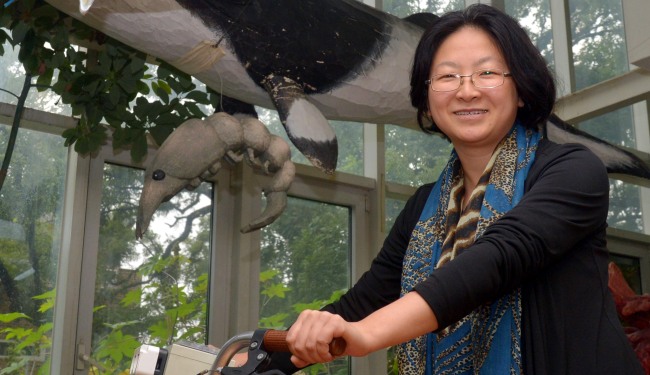Autumn is the best season for hiking and mountain climbing in Korea with the crisp and mild weather, and colorful leaves. But for environmental activists, it is the season that worries them the most.
Maeng Ji-youn, a director of the Seoul-based Korean Federation for Environmental Movements, is one of the outspoken activists who have called on climbers and developers to stop environmentally-unfriendly activities and seek ways to harmoniously coexist with the nature.
“Mountains, designated as national parks, are what we have borrowed from our future generations. We are just borrowers, not their owners. Thus, we have the crucial obligation to keep them unharmed,” she said during a recent interview with The Korea Herald.
“It is frustrating to see many people trying to commercialize the mountains and view them only from a business standpoint, rather than recognizing them as treasure troves of endangered animal species, rare plants and beautiful sceneries.”
Maeng has worked at the KFEM for some 12 years ago. The KFEM is the country’s largest environmental activist group with some 50,000 members registered under some 50 regional branches. Launched in 1993, the organization has led Korea’s environmentalism.
In recent years, Maeng and her fellow KFEM activists have led a series of campaigns to keep local mountain developers from building hotels, ski resorts and golf courses, and installing cable cars. She stressed that these development projects should be reconsidered in consideration of the detrimental impacts on the preservation of the national parks.
“Once damaged, those mountains can hardly be restored. Particularly the summit areas should be well protected. But developers are putting metal poles all over the mountains and trying to install cable cars linking the entrance to the summit ― an extremely worrisome situation for me,” she said,
 |
Maeng Ji-youn, a director of the Seoul-based Korean Federation for Environmental Movements, poses for a photo before an interview with The Korea Herald at her office in Seoul this week. (Kim Myung-sub/The Korea Herald) |
“Cable cars would increase the number of people reaching the summits. But do we really have to walk on the summits? Can we not be satisfied just with the fresh air, sceneries and the soothing feelings the mountains provide? Do we really have to compete over who reaches the summits first?”
A passionate activist who has engaged in environmental activism for some 15 years, Maeng pointed out that South Koreans’ overall awareness of environmental protection should be raised. She stressed the need to create a new culture of “moderate” mountain climbing in which people take the pleasure of just being with nature.
“We should share the responsibility to keep the mountains intact and pass them down to our future generations. If we are not aware of this, we will end up damaging not only various wild fauna and flora, but also the sceneries,” she said.
Touching on the protection programs in foreign countries, Maeng said that Korea could adopt some of them. The programs include allowing only those who have made reservations to enter national parks and banning nighttime climbing.
Some of South Korean national mountain parks have implemented a program to allow mountain climbing only during designated hours to prevent overcrowding. But the country should seek more creative ways to preserve the parks, Meang said.
“In some foreign countries, as far as I understand, climbers are asked to bring back even the water they used to brush their teeth ― an indication of how much effort they put into to protect mountains and how much they honor nature,” she said. “But there are still people here who even cook in the mountains and hike through the paths closed for the public.”
Living as an environmentalist is not easy, Maeng noted, as Koreans tend to look at activists’ movements through their political, ideological lens, calling them impure, leftist forces ― a reason why she has found it extremely difficult to approach the public to promote her purely environmental drive.
“Even though we, within the confines of the Constitution, argue that mountains, rivers and other parts of our nature should be preserved and protected from excessive development, many call our projects ‘leftist thinking’ and look at us with great suspicion,” said Maeng.
“This ideological labeling is not going to help our society’s advancement.”
By Song Sang-ho (
sshluck@heraldcorp.com)








